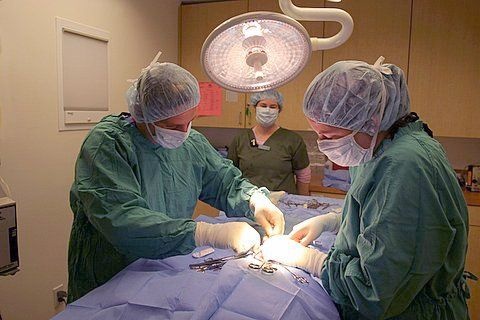Surgery
Surgery
The doctors at Cats Exclusive are trained to perform many surgical procedures. We perform many routine procedures, like spays (ovariohysterectomies), neuters (castrations), and mass removals. We can also perform more extensive procedures, including intestinal surgeries, cystotomies (removal of bladder stones), and wound repairs. As advocates for cats, we do not perform declaw surgeries, please see the AAFP's (American Association of Feline Practitioners) Declawing Position Statement. For highly complex cases, we maintain close relationships with surgical specialists, and can advise our clients when referral is needed.

We have specifically designed our surgical suite to cater to the unique physiologic needs of cats:
- Our heated surgery table and Bair-Hugger warming system keep cats warm during surgery, which helps them recover faster.
- We constantly monitor heart rate, blood pressure, oxygenation, and body temperature to ensure safety during anesthesia.
- Intravenous fluids are administered during most procedures to help maintain blood pressure and hydration.
- Cats are constantly monitored while waking up from anesthesia.
- Pain management protocols are individually tailored to your cat’s needs, according to the type of surgical procedure.
Q & A About Your Cat's Upcoming Surgery
Many people have questions about various aspects of their cat’s surgery, and we hope this information will help. It also explains the decisions you will need to make before your cat’s upcoming surgery.
Is the anesthetic safe?
Here at Cats Exclusive Veterinary Center we take several precautions to ensure the safety of your cat while under anesthesia. We do a thorough physical exam on your cat before administering anesthetics to ensure that there are no underlying illnesses. We use a pulse oximeter monitor during the anesthetic procedure which monitors your cat’s heart rate and respiratory rate. We also adjust the type of anesthetic used based on the health of your cat.
Pre-anesthetic blood testing is important in reducing the risk of anesthesia. Every cat needs blood testing before surgery to ensure that the liver and the kidneys are functioning normally. Even apparently healthy cats can have serious organ system problems that cannot be detected without blood testing. If there is a problem, it is much better to find it before it causes anesthetic or surgical complications. If serious problems are detected, surgery can be postponed until the problem is corrected. Your doctor will tell you what blood panel is advised for your cat.
Can my cat eat the morning of the surgery?
Your cat will need to be fasting after midnight the night before the surgery. It is okay to leave water available.
Will my cat have stitches?
For many surgeries, we use absorbable sutures underneath the skin. These will dissolve on their own, and do not need to be removed later. Some surgeries do require skin stitches. With either type of suture, you will need to keep an eye on the incision for swelling or discharge. Most cats do not lick excessively or chew at the incision, but this is an occasional problem you will also need to watch for. If there are skin sutures, these will usually be removed 10–14 days after surgery. You will also need to limit your cat’s activity level for the first 5–10 days after surgery.
Will my cat be in pain?
Anything that causes pain in people can be expected to cause pain in cats. Pain medications needed will depend on the surgery performed. Major procedures require more pain relief than things like minor lacerations.
Cats cannot tolerate pain medications (aspirin, Tylenol, ibuprofen) commonly used in people. Recent advances in pain medications have allowed for better pain control in cats than ever before. We administer pain medication before and after surgery. Any cat that appears to be in pain will receive additional pain medication. Providing pain relief is appropriate and is a humane and caring thing to do for your cat.
What appointments are needed?
When you bring your cat in for surgery, we ask that you allow 15 minutes of time to fill out paperwork and to meet with a nurse. We will schedule a discharge appointment so that we can go over your cat’s home care needs after the surgery.
We will call you the night before your scheduled surgery appointment to confirm the time you will be admitting your cat and to answer any questions you might have. In the meantime, please don’t hesitate to call us with any questions about your cat’s health or surgery.
See also:



